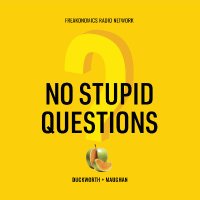
Freakonomics
@Freakonomics
Follow the Freakonomics Radio podcast for weekly episodes that explore the hidden side of everything — with host Stephen J. Dubner.
ID:14514804
http://www.freakonomics.com 24-04-2008 17:29:35
16,8K Tweets
620,6K Followers
1,0K Following


The economist and social critic Glenn Loury has led a remarkably turbulent life, both professionally and personally. In a new memoir, he has chosen to reveal just about everything. Why? freak.ws/3VcXzND

Can you be too nice? Where is the line between a good guy and a doormat? Do people with sharp elbows make more money? And why did Angela Duckworth’s mother give away her birthday present? freak.ws/3WAh8jX


A college fraternity’s budget includes broken windows, liability insurance, chili dog breakfasts, and the occasional $40,000 DJ. Zachary Crockett crashes the party. freak.ws/4dC1LNW



What do Coach Tommy Tuberville and Elizabeth Warren agree on? No, it’s not a riddle: they both support ESOPs, or Employee Stock Ownership Plans. But even with bipartisan support, ESOPs are rare. This week, the advocates and financiers who want to change that. freak.ws/3ykrHgF



Is it okay to be an introvert? What’s the difference between being introverted and being shy? What are extroverts so cheerful about? And does Angela Duckworth’s social battery ever run out? freak.ws/4b2nFZ1

Once upon a time, there was a place that was so dynamic that it seemed as if the future had already arrived. Stephen Dubner interviewed Richard Cockett about that place, the subject of his new book, Vienna. freak.ws/3whOR6Q

How does bail work — and who’s really paying? Zachary Crockett follows the money. freak.ws/3JRX7hb

“How do you disagree creatively? How can you moderate your disagreements to create something good? If you’re both doing it in good faith.” —Richard Cockett, author of Vienna, on the birth of intellectual movements. freak.ws/3whOR6Q


“If you want to protect this sort of culture, you have to be strong in your will to protect it.” —Richard Cockett, author of “Vienna: How the City of Ideas Created the Modern World”, on lessons learned from history. freak.ws/3whOR6Q

From politics and economics to psychology and the arts, many modern ideas emerged a century ago from one European capital. Historian Richard Cockett explores all those ideas — and how the arrival of fascism can quickly ruin what took generations to build. freak.ws/3whOR6Q

Economist Joseph E. Stiglitz has devoted his life to exposing the limits of markets. He tells Steve about winning an argument with Nobel laureate Milton Friedman, why small governments don’t lead to more freedom, and why he’s not afraid to be an advocate. freak.ws/49WuEBw

Are you as conscientious as you think you are? Is it really that important to make your bed? What’s the benefit of hiring a lazy person? And how many cups of spinach can Mike Maughan fit in a red Solo cup? freak.ws/4a0pDHQ

What would Justin Trudeau be doing if he weren’t Prime Minister of Canada? Stephen Dubner asked him. freak.ws/3JzJbs4